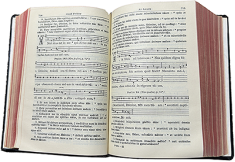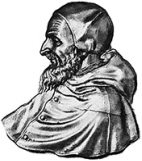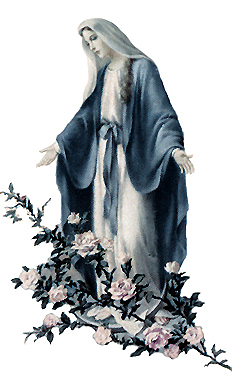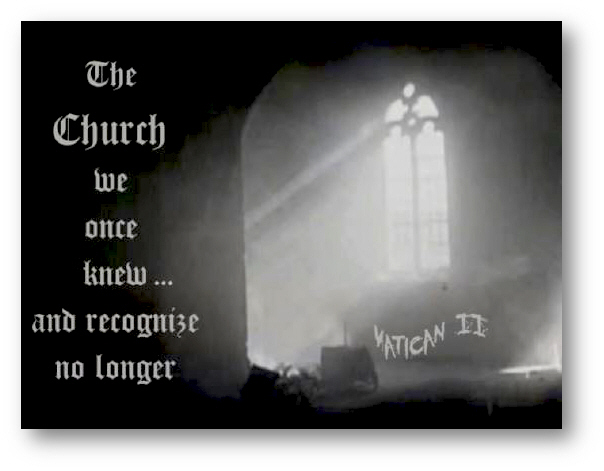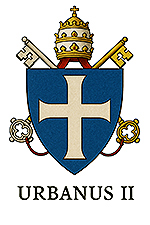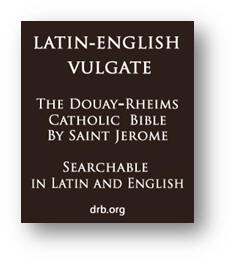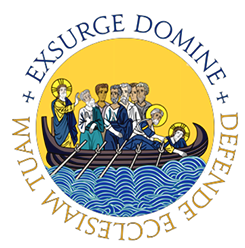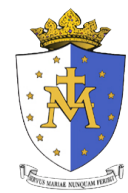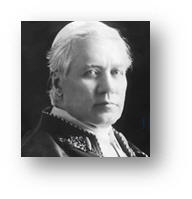|
Martyrology for Today
|
|
After many, many, months of intense study into comparative translations, we believe that we have arrived at a scrupulous and carefully curated translation — from the original — and are very pleased to present the beginning of the first English translation of the 2004 Roman Martyrology from the original Latin promulgated nearly a quarter century ago by the Congregation for Divine Worship and the Discipline of the Sacraments in February of 2001 under the authority of Pope John Paul II, and printed in 2004 (by the Libreria Editrice Vaticana). This is too precious a patrimony to leave Holy Mother Church’s children bereft of, with no accessibility to it’s imponderable depths, no glimpse into the blinding heights to which their love inexorably brought them through immeasurable pain. If their story is no longer compelling, no longer worth telling; if it has ceased to be urgent, then the Communion of Saints has been broken and we peer back through indecipherable runes to a hallowed past we no longer comprehend. For me, however, and for others in the Anglosphere who have been nourished, as it were, on the blood of the Martyrs as Tertullian might say, in our long and often painful journey to Christ, their story is in some measure inescapably our own. Their witness has sustained us in dark moments; we may even dare say that in studying them we have made many intercessors ... and even friends. Once complete, the entire 2004 Martyrology will be both downloadable and printable — free. In part or in its entirety. Gratis accepistis, gratis date. (St. Mat. 10.8) To my readers I must warn you that this is a slow journey. At times a few days at a time at best. But the company we will keep will be the best possible. I must ask for your prayers, however, which are most needful to me.
If you choose to follow, we are presently here: April of the 2004 Roman Martyrology (we hope to add several days regularly)
In the Immaculate Heart of Mary, Geoffrey K.
Mondello For the Original Roman Martyrology 2004 in Latin, transcribed line by line from the original for textual consistency and visual clarity, including diacritical marks, click here.
|
MISFORTUNE
and what we should
learn from the trials of Job
“Naked came I out of my mother’s womb, and naked
shall I return thither:
the Lord gave, and the Lord hath taken away: as it
hath pleased the Lord so is it done:
blessed be the name of the Lord. In all these things
Job sinned not by his lips,
nor spoke he any foolish thing against God.”
(Job 1.21-22)
Job
lost everything
Everything:
children,
house, health, good name, property ... you name it,
and Job lost it. Covered with boils from “the sole
of his foot to the crown of his head,” he sat upon
the ashes he poured over his head and scraped
himself with a potsherd. Even his wife reviled him:
“Curse God and die.” Three friends came, barely
recognizing Job, and sat a week with him in silence.
They then proceeded to “console” Job ... by
convicting him of his sins ... sins he never
committed.
Finally, Job himself uttered what we all have
uttered at one time or another in our lives:
“Why did I not die at birth, come forth from the womb and expire?”
In other words, would that his nakedness had never been clothed in honor and glory — for then he would not know the pain of losing what he never had.
But God had,
“... made a fence for him, and his house, and all his substance round about, blessed the works of his hands, and his possession hath increased on the earth?” (Job 1.10)
God prospered Job.
The evil one, knowing
this, tore down the hedge, devastated Job’s house,
and tempted Job to despair ... to give
up on God.
And yet ... incredibly, “in all these things Job
sinned not.”
Job was blameless
before God.
We know Job
We have
been
Job ... in
one form or another at some point, perhaps at many
points, in our lives. We have been devastated,
deprived of what we esteemed good, lost our health,
our jobs, our dignity, security ... and, for great
sorrow, even our families.
How do we console ourselves? Most often, as Job’s
friends had consoled him, we tell ourselves that our
misfortune is, in some incomprehensible sense,
just ... that we are suffering the rigors
of an exacting and ineluctable justice that we had
somehow eluded for sins or crimes we no longer
remember ... from which we had inexplicably managed
to escape, and which have finally caught up with us
and demanded tribute.
However, the fact of the matter is that — at least
in the case of Job — Job’s misfortunes were not
just. There was no proportion between what he
suffered and what he had done — indeed, Job had done
nothing but good! Job’s misfortunes, we find, were
not God’s “payback.”
And neither are ours.
Even were justice demanded of us for our sins — and unlike Job, our own sins are many — we can never make adequate restitution, never pay reparation, for we are too poor. We had squandered that patrimony of grace which had been given our First Parents in justice, and we forfeited it just as they did — even after Baptism washed us of that Original Sin, that primal effrontery through which our patrimony became our poverty!
Only what is
without sin can cancel sin. And that justice
has already been rendered — through Jesus
Christ on the Cross.
Yes, God is just. But it was not Job — and it
is not us — it is God Himself who paid
the price of justice in the shattered humanity of
Christ.
Rendering Justice to God
God did not – and He does not – exact the restitution of justice from us. We do not possess the tribute, the wherewithal — and we are fools, or deceived, if we believe that we can render justice to God. Only God can render justice to God. Why? Because the plenitude of justice that is God and that is due God is infinite because God Himself is infinite. His justice — like His love, goodness, and mercy — is the perpetual act of His being: it is, as it were, the very fabric of His Being: a “Being-good,” a “Being-loving,” a “Being-merciful” ... and a “Being-just”.
Love, mercy, goodness,
justice are not merely “parts” of God's Being
— rather, His being is a “Being-good,”
“Being-loving,” “Being-merciful” ...
and “Being-just.” These infinite and
eternal acts (the acts of being:
a-being-loving, a-being-good, a-being-just) do not
simply coincide with His Being as something
extraneous to it — they constitute His
Being! To sin against justice, then,
is to sin against the infinite justice of God
Who alone is a Being-just ... and note
merely a “just” being. How, then, can finite
man make infinite restitution? We cannot.
Only Christ, being God, could — on the Cross. That
is why Jesus is called, “the Just One.”
*
So, what of Job? What of us?
We came into this
world with nothing. We will leave it with nothing.
We think that we have worked for, earned, all
the good things we enjoy, and reckon the day they
may be taken from us injustice, not
understanding that injustice was never done
us, for we never merited, deserved, any
of these things. What, then, of all our hard work
and sweat?
Ask yourself from the depths of the truthfulness of
your being: have you worked harder,
more diligently, more desperately,
more deservingly, than the poverty stricken
farmer in sub-Sahara Africa? Why is he not
adorned as you? Why is his plate empty?
Because you are “more just” and these things
are “more justly” yours (your “due” in
justice?) — but somehow not his?
If you possess power, wealth, esteem, glory, in this
world, do not congratulate yourself on your
diligence, your “uncanny” insight, your “good luck”
and success. Given the blandishment of the evil one
— the “father of lies” — which we find in the
temptation of Christ, it is, I suggest, far more
appropriate to tremble.
Behold Job. And also behold Christ — Christ Who was
also tempted by that same evil one
who, in his empty promise, is frightfully revealing:
“And the devil led Him into a high mountain, and showed Him all the kingdoms of the world in a moment of time; and he said to Him:
To thee will I give all this power, and the glory of them; for to me they are delivered, and to whom I will, I give them.” (Saint Luke 4.5-6)
Ask yourself soberly:
whence your prosperity, your power, your
wealth? From whom, and to what end?
And at the cost of whose dignity and through the
poverty of how many did you acquire it? Prosperity,
many Protestants hold, is a sign of God’s
favor, a token of His predilection: if you are
“just” and “Godly,” God will prosper you.
Misfortune and suffering, then, are —
much in line with the reasoning of Job’s “consolers”
— afflictions from God. They are the
penalty — meted out by God — for “injustice”
and “ungodliness.” Material prosperity, on the other
hand, together with wealth and power — these are
God’s blessings for the “just.” It
is, in a word, their “reward” ... their “due” in all
justice.
But it was not Saint Paul’s ... nor the “reward” due in “justice” to the other Apostles:
“Even unto this hour we both hunger and thirst, and are naked, and are buffeted, and have no fixed abode;
And we labour, working with our own hands: we are reviled, and we bless; we are persecuted, and we suffer it.
We are blasphemed, and we entreat; we are made as the refuse of this world, the offscouring of all even until now” (1 Cor. 4.10-13)
This was the insidious trap set for Job by the devil through his “consolers” ... and by our own self-recrimination in the face of misfortune. We are confronted with misfortune. Who is to blame? With incredible subtlety, the devils suggests that either we are guilty — or God is! If we are not guilty for this misfortune, then God is. If God is not, then we are. But neither is the case!
In other words, Job brought it unknowingly upon himself — and God (not the devil, mind you ...) was perfectly willing to be complicit in this injustice —by punishing Job for what he did not do! What is more, He punished Job by “unjustly” taking away “what was his.” It was a masterpiece of illusion! Diabolically brilliant! Job was tempted by the devil to despair in having “unjustly” lost all that was “not his in justice” to begin with!
In a supreme irony,
Christ was tempted by the same devil to idolatry
through an empty promise to give Him what was
already His to begin with.
Remember, who precisely was it who had
said that wealth, material prosperity,
and power was his to give? And
who was it that took it away from Job
– that was his to give and
his to take?
Misfortunes are not from God. Nor are
they the penalty of your sins, for you would then
have nothing (given your countless sins and the
justice that would be exacted for each.)
Misfortunes, suffering, want, pain, destitution,
illness, are not lofty, if cruel, tributes to
justice! They are evils! Evils out of which God
ever brings good ... as He did with Job who, “in
all these things ... sinned not.”
Misfortune is not of your own making — still less is it from God. Saint Paul understood this.
You must also:
“For our wrestling is not against flesh and blood; but against principalities and power, against the rulers of the world
of this darkness, against the spirits of wickedness in the high places. Therefore take unto you the armor of God,
that you may be able to resist in the evil day, and to stand in all things perfect.” (Ephesians 6.12)
Let us see misfortune for what it is — and not for what the “father of lies” would entice us to believe. Evil is from the “evil one,” endlessly contending with the ever-redemptive love of God lifting us up from the squalor of misery through the arduous path to holiness, calling us from that relentless malice that would pull us down to despair.
_____________________________________________________
* Acts 7.52
Geoffrey K.
Mondello
Editor
editor@boston-catholic-journal.com
Boston Catholic Journal
www.boston.catholic.journal.com
May 26, 2025, Feast of Saint Philip Neri

Leo XIV Continues Francis’s Obsessive Agenda:
Deconstructing the Catholic Church
What appeared to be a promising beginning, is unfolding as not just more of Francis, but the fulfillment of Francis’s most obsessive — and destructive — agenda for the Post-Catholic Conciliar Church of Vatican II which is now more, than ever, appears entirely estranged from the Church that baptized, taught, blessed, sanctified, and buried her children for the 2000 years prior to that catastrophic Council that “built bridges” to the world by burning bridges to her past — and lost God in the sorry trade.
Let us consider one change in appointments that he has made — which is really no change at all — that is indicative of more than his his pontifical posture, but his “progressive” (unorthodox) theology under the tutelage of his predecessor, promoter, and friend, Francis:
The Pontifical John Paul II Institute for Marriage and Family Sciences
Leo indeed removed Cardinal Vincenzo Paglia, a man of unenviable repute. It is true. It is also true that he replaced him with a man little — if any — better than he was.
Indeed, while Cardinal Baldassare Reina is now Grand Chancellor of the Pontifical John Paul II Institute for Marriage and Family Sciences — Paglia remains President of the Pontifical Academy for Life!
Quite a shake-up, no?
No.
There is much more to this
pontifical legerdemain than this ecclesiastical
shell game, and the personalities that appear to
prevail indicate more about Leo than his growing
absence of transparency ...
Geoffrey K. Mondello
Editor
Boston Catholic Journal
Comments? Write us: editor@boston-catholic-journal.com
“But we have the mind of Christ.
“But we have the mind of Francis.” Pope Leo XIV: “I would like to assure you of my intention to continue Pope Francis’s commitment to promoting the synodal nature of the Catholic Church and developing new and concrete forms for an ever stronger synodality in ecumenical relations.”
The Most Urgent Question of Our Time:
“When the Son of Man Comes, will He Find Faith on Earth?”
(St. Luke 18.8)
No more stunning, no more
frightening, and perhaps no more ominously portentous words
are spoken in all the Gospels, in fact, in the entire New
Testament — perhaps even in the entirety of Sacred Scripture
itself; words that have become increasingly fraught with
significance with every passing year of the most unfortunate
papacy of Francis — a papacy not just likely … but I
believe with certainty … will be understood not simply as
among the worst … but the worst … the most destructive to
the Faith and to the Church in the annals of 2000 years of
Church history.
Indeed, with every generation following that devastating
Second Vatican Council — that scorched earth assault on
Tradition and historical Catholicism — the question
increasingly verges on an implied and obvious answer.
Indeed, we must wonder if the question that Christ poses …
“When the Son of Man comes will He find Faith on earth?” …
is, in fact, spoken of this generation, or of one soon —
very soon, to come.
As with so many of Christ’s teachings, this troubling
question is too often and too deftly explained away —
especially by the overwhelming number of the liberal
theologians and bishops who have proliferated and multiplied
since 1962 — which is to say, by “the
learned and the wise”. If we heed them, it would
appear that either Christ does not know what He is
saying, or we do not know what He is saying —
although we all agree that He said something ... that
sounds suspiciously clear.
We must, however, pay careful attention to these twelve
words, …. perhaps more now than at any
other time in Church history.
“When the Son of Man comes will He find
Faith on earth?”
These are twelve words, however, to which we must pay
careful attention, perhaps more now than at any other time
in Church history.
However reluctant we are to take Christ at His word — which
becomes increasingly inconvenient to us — we must recognize
that Jesus never spoke idly: His words, His teachings — and
yes, His Commandments — were always uttered to one
explicit end: the salvation of souls — attaining to Heaven
and everlasting happiness and to avoiding Hell and eternal
misery.
The Jewish religious authorities — “the learned” of His own time — had scornfully dismissed Christ’s warning that not so much as stone would remain standing in the great Temple 1 ... the very Temple within which, 70 years later, these words were fulfilled when Rome laid waste in days what took 46 years to build.
We tend to view such alarming statements made by Jesus — and
there are many — with the same scorn and disdain today.
Indeed ... what has become of the “Faith of our Fathers?”
A mere fifty years ago we ourselves would have instinctively
replied “Of course He will find faith! There simply
must be some deeper, some obscure and less evident meaning
to this that we do not presently understand — and what He
appears to be saying, He is not really saying at all.
Surely the “learned” of our own day can deftly explain the
answer to this troubling question. In the end, they will
conclude, Jesus is really asking something entirely
different from what He appears to be asking and
that it has nothing to do with our very real defection from
the Faith.”
It is likely that many Jews of Jesus’ time — both the
learned and the unlearned — had replied in much the same
way. In fact, they did.
In other words, to us, our faith, the Faith of the Catholic
Church for two millennia, could no sooner disappear than ...
well, the stones of the great Temple 2000 years ago!
If, however, we take a careful inventory of our present and
undeniably dismal and increasingly scandalous situation in
the Church — especially as it has unfolded in the last five
decades — Jesus does not quite appear as ... “perplexing”
... as so many apparently make Him to be.
Candidly Ask yourself the following:
Has the Faith — the Catholic Faith — flourished in
the last 50 years, or has it withered?
Are vocations to the Priesthood and Religious life
growing or dwindling?
Are Catholics having more children or are they having
fewer children?
Are Missionary efforts, to the end of (dare we say
it?) “conversion” as mandated by Christ
encouraged as intrinsic to Catholicism
— or are they discouraged as impolite, obtrusive,
culturally imperialistic and inherently inimical to the
“Ecumenical spirit of Vatican II” — especially as
interpreted by Pope Francis for whom “proselytism is solemn
nonsense,” to use his own words, words that mock the
sacrifices of countless missionary saints through the 2000
years preceding Vatican II’s
“more
enlightened” understanding of the
Great Commission*?
Rather, we find that “conversion” to Christ and His Church
is actively discouraged — that especially under Pope
Francis it is no longer understood as a holy and
inherently necessary endeavor — instead, it is
disdained, even dismissed, as “socially and culturally
incorrect” — indeed, we find that promoting our
Catholic Faith — as Christ has commanded us to— has
been forbidden by Francis and his “progressive”
coterie of feckless and disaffected cardinals and bishops!
What pope, prior to Vatican II, could ever have envisioned
this?
Is our understanding of the Catholic Church, as an
absolutely unique institution indispensable to the ordinary
means of salvation, emphasized as urgently today (if it
is emphasized at all) as it was a hundred years ago? Fifty
years ago? Indeed, is the concept itself — of the
singularity and indispensability of the Holy Catholic Church
— still deemed an actual dogma and a viable concept
at all?
For all our insolence and equivocation, we know the answers,
and we are uncomfortable with them, for they fly in the face
of Christ and all that He taught — to say nothing of Sacred
Scripture, Holy Tradition, and the Sacred Deposit of the
Faith entrusted to the Catholic Church by God Himself.
Indeed, Christ’s question takes on a greater sense of
urgency still, for the sheep are scattered and confused as
never before. The papacy of Francis has been disastrous for
the Church. Why? Precisely because he has taken Vatican II
to its logical conclusion: the irrelevance of the
Church.
Ubi est Pastor?
Where is the Shepherd? Who is earnestly addressing
this spiritual malaise and religious decay due to the
indolence and dereliction of the vast majority of American
and European bishops who appear far more eager for secular
plaudits than the now quaint and discredited notion of “the
salvation of souls.” Pope Francis has effectively declared
this mandate defunct in favor of the rehabilitation of
bodies, societies, economies, and “the environment”. That
the passing material environment of man is infinitely
less important than the eternal abode of his soul,
often appears to elude Francis. Indeed, it appears to elude
most Catholics whose mantra increasingly coincides with the
world’s: Social activism! ... not interior
conversion away from this world ... and to Christ.
Shame! Shame on us! By our silence, our fear of being
disparaged by “other Catholics” for the sake of Christ, we
condone this travesty — are complicit in it ... even
promote it!
What will motivate us to recognize, and to redress, this frightful and ultimately deadly state of affairs?
There are, after all, other contenders in this world for the
souls of men ... seen and unseen! As our own wick smolders,
others blaze! The burning Crescent of Islam, poised like a
scimitar, and every bit as deadly, glows and grows in the
east, and with it, not an ethnic, but a Religious
Cleansing to which the world remains indifferent — an
expunging of every vestige of Christianity in partibus
infidelium. And even Islam has its secular
collaborators: the European Union — once a continent raised
up from utter barbarism to a civilization formed and
ennobled by its Catholic heritage — will no longer tolerate
the inclusion of its indissoluble Christian heritage within
its Constitution. Not only does it thoroughly repudiate its
own Christian cultural heritage — it prohibits it —
even banishes it! This is nothing less than
self-loathing. And perhaps it ought to be.
Surely, then, in our effort to remedy this impending state
of dissolution, we will first turn to our bishops, since
they are, preeminently, the “Teachers and Guardians of the
Faith”. But more often than not — much more often than not —
in the well-appointed office at the end of the corridor we
do not find a shepherd of souls but a deeply sequestered,
occasionally avuncular, and predictably remote ...
“administrator.”
Relegating his prime responsibility as Teacher and Promoter
of the Faith ... to others, in the form of Lay committees
and subcommittees largely “chaired” by liberal Catholics
more concerned with social issues than the salvation of
souls, are we confident that the patrimony of our faith will
somehow percolate through this strata of already
contaminated soil and reach our children authentically and
intact? Is our fear mitigated ... or further exacerbated ...
by our bishops’ resolute lack of diligence in being
attentive to what Catholic colleges and theologians in their
own dioceses are really teaching — and who are teaching the
teachers ... who, in turn, are teaching our children?
Do you think that your bishop actually — that is to say,
cognitively — is aware of, or even concerned with — what the
teachers themselves are actually teaching?
Not in this diocese. Not in Boston. In fact, Cardinal Sean
Patrick O’Malley had routinely feted, praised, and held up
as exemplary, the clueless “Catechists” who churn out our
children to the Sacrament of Confirmation — with no clue
whatever of that in which they are being confirmed. By
comparison, even the dismal failure of our public schools in
Boston must be deemed a stunning success.
For most of us — especially in the Archdiocese of Boston,
but no less elsewhere — the answer is, as they say, a
“no-brainer:” it is a universally resounding no. Most
of us find, to our growing dismay and deepening cynicism,
that our bishops appear to have “more important,” more ...
“pressing” things to do ... than to communicate the Faith to
the faithful ... especially the children.
Really, we beg the question: if no one teaches the teachers
— who, then, teaches the children? If they are not brought
the faith by those to whom it has been entrusted — the
bishops, the episcopacy — who will bring it to them?
Will they — how can they — acquire the Faith ... if
no one brings it to them? Saint Paul is very clear about
this:
“How then shall they call on him, in whom they have not believed? Or how shall they believe him, of whom they have not heard? And how shall they hear, without a preacher? And how shall they preach unless they be sent ...?” (Romans 10.14-15)
Ask yourself candidly: do you know more ... or less ... of
your Catholic faith than your children? Very likely more —
although, in all honesty, it is probably little. You
politely assent to the now quaint Catholic notion that
“parents are the primary teachers of their children,” but
knowing little of your own Faith, you simply shell out
$175.00 per child and pan off this grave responsibility to
others of whom you know nothing, and who themselves largely
know nothing of the faith they presume to teach. You go
through the motions as careless of what your children are
taught in their 10 years of “Religious Education” as your
bishop is of what the teachers teach. 10 years later, and
$1500 poorer per child, you scratch your head and wonder why
Johnny still does not know God, and why Judy never goes to
Mass — and yet we have agreed that you know more than your
children ...
What, then, we must ask — with growing apprehension — will
your children teach their children ...?
What will they — who know even less than you —
teach those who know nothing?
Total Ignorance
The momentum, as we see, is inexorable — until it culminates
in total ignorance: every generation knows less of their
faith than the generation preceding it. It is, in the end,
the devolution from doctrine to legend, from legend to
fiction, and from fiction to myth.
That is not just a poor, but a stultifying and ultimately
deadly patrimony.
This default — at every level — in transmitting the
authentic Catholic faith intact ... leaves Jesus’
question very suddenly very real.
“Recently, a Gallup poll was taken on Catholic attitudes toward Holy Communion. The poll showed serious confusion among Catholics about one of the most basic beliefs of the Church. Only 30 percent of those surveyed believe they are actually receiving the Body and Blood, soul and divinity of the Lord Jesus Christ under the appearance of bread and wine.”
The problem is more than mathematical; as we have seen, it
is exponential. 70% of Catholics do not possess this most
fundamental, this most essential understanding of the core
article of genuine Catholic doctrine: that
“Unless you eat of the flesh of the
Son of Man, and drink His Blood, you have no life in you.”
Heavy stuff!
It is not just a matter of the greatest concern, but nothing
less than a matter of the gravest dereliction that most
Catholics do not realize — do not know — that the very
Mass itself is an abbreviation of “The Most Holy
Sacrifice of the Mass”, and that it is really a Sacrifice,
the actual re-enactment of Calvary before their very eyes!
This failure of understanding ... culminates in a failure in
Faith. It possesses, in significant ways, the remorseless
characteristics of mathematical certainties. Not
understanding, grasping — having never been taught — the
most elementary features of the faith, how can they be
understood to possess what they have not acquired, and how
can they transmit, pass on, what they do not possess? It is
inescapable.
Prognostication, of course, is for fools.
But the words of Christ are certainties that will come to
pass.
“Weep not for Me, but for your
children”, 5 Christ
told the sorrowing women on the road to Calvary.
Jesus’ question, then — “When the Son
of Man comes will He find faith on earth?”— is
not a “rhetorical question” at all; it is a question fraught
with enormous significance ... the frightful answer
to which appears to be unfolding before our very eyes ...
but that is if you take Christ at His word — and given
Jesus’ track record on things yet to come, we would do well
and wisely to give pause for more than thought.
Are you worried now ...? Not nearly enough.
And this is all the more frightening still.
Geoffrey K. Mondello
Editor
Boston Catholic Journal
Comments? Write us: editor@boston-catholic-journal.com
The Holy Catholic Faith
Where is it And Who is Keeping it?
Has the
Post-Conciliar Church
Lost Custody of the Faith?
All indications are that is has.
The “Dark Ages” — that disdainful term for the period in history following the collapse of the Roman Empire in 476 A.D. until the 15th century (a period correctly described as the Middle Ages) is understood by the secular world to have lasted roughly 1000 years, beginning in Florence, Italy.
Within the post-Conciliar Catholic Church, however, it appears that the term extends well beyond the 15th century; indeed, some 500 years beyond it! According to contemporary Catholic thought articulated within the past five papacies, the “Dark Ages” really ended in 1965 at the conclusion of the Second Vatican Council. All the doctrines and teachings prior to that Council were only imperfectly, deficiently, and insufficiently articulated or defectively understood.
The 1000
Years of Darkness
Only
the Second Vatican Council finally attained to enlightenment
in the divine economy, and after 1,965 years of suspension,
it alone has provided the final, sufficient, and correct
understanding of God and Church, man and nature. Prior to
that, according to post-Conciliar thought, Catholics had
essentially lived in darkness, specifically the darkness
of the “pre-Conciliar Dark Ages.” It may be said that where
the Rational Enlightenment “saved the world from religion,”
Vatican II saved the Church from Catholicism.
Semen est sanguis Christianorum (The blood of Christians
is the seed of the Church) Tertullian, Apologeticum,
50
ROMAN MARTYROLOGY
Tuesday July 8th in the Year of Grace 2025
At Spina Lamberti in Emília, Pope
St. Adrian III, famous for his zeal in reconciling
the Eastern to the Roman Church, and renowned for his miracles.
His body was taken to the monastery of Nonantola and buried
with honors in the Church of St. Sylvester. Response: Thanks be to God.
|
Roman Martyrology by Month
| March | April | May | June | ||
| July | August | September | October | November | December |
The Roman Martyrology can now be downloaded entirely as either a PDF file or as a Microsoft Word File.
Why the Martyrs Matter
Each day we bring you a calendar,
a list really, of the holy Martyrs who had suffered and died
for Christ, for His Bride the Church, and for our holy Catholic
Faith; men and women for whom — and well they knew — their
Profession of Faith would cost them their lives.
They could have repudiated all three (Christ, Church, and Catholic
Faith) and kept their lives for a short time longer (even the
lapsi * only postponed their death — and
at so great a cost!)
What would motivate men, women, even children and entire families
to willingly undergo the most evil and painfully devised tortures;
to suffer death rather than denial?
Why did they not renounce their Catholic Faith when the first
flame licked at their feet, after the first eye was plucked
out, or after they were “baptized” in mockery by boiling water
or molten lead poured over their heads? Why did they not flee
to offer incense to the pagan gods since such a ritual concession
would be merely perfunctory, having been done, after all, under
duress, exacted by the compulsion of the state? What is a little
burned incense and a few words uttered without conviction, compared
to your own life and the lives of those you love? Surely God
knows that you are merely placating the state with empty gestures
…
Did they love their wives, husbands, children — their mothers,
fathers and friends less than we do? Did they value their own
lives less? Were they less sensitive to pain than we are? In
a word, what did they possess that we do not?
Nothing. They possessed what we ourselves are given in the Sacrament
of Confirmation — but cleaved to it in far greater measure than
we do: Faith and faithfulness; fortitude and valor, uncompromising
belief in the invincible reality of God, of life eternal in
Him for the faithful, of damnation everlasting apart from Him
for the unfaithful; of the ephemerality of this passing world
and all within it, and lives lived in total accord with that
adamant belief.
We are the Martyrs to come! What made them so will make us
so. What they suffered we will suffer. What they died for, we
will die for. If only we will! For most us, life will be
a bloodless martyrdom, a suffering for Christ, for the sake
of Christ, for the sake of the Church in a thousand ways outside
the arena. The road to Heaven is lined on both sides with Crosses,
and upon the Crosses people, people who suffered unknown to
the world, but known to God. Catholics living in partibus
infidelium, under the scourge of Islam. Loveless marriages.
Injustices on all sides. Poverty. Illness. Old age. Dependency.
They are the cruciform! Those whose lives became Crosses because
they would not flee God, the Church, the call to, the
demand for, holiness in the most ordinary things of life made
extraordinary through the grace of God. The Martyrology we celebrate
each day is just a vignette, a small, immeasurably small, sampling
of the martyrdom that has been the lives of countless men and
women whom Christ and the Angels know, but whom the world does
not know.
“Exemplum enim dedi vobis”, Christ
said to His Apostles: “I have given you an example.” And His
Martyrs give one to us — and that is why the Martyrs matter.
-
A Martyr is one who suffers tortures and a violent death for the sake of Christ and the Catholic Faith.
-
A Confessor is one who confesses Christ publicly in times of persecution and who suffers torture, or severe punishment by secular authorities as a consequence. It is a title given only given to those who suffered for the Faith — but was not killed for it — and who had persevered in the Faith until the end.
Geoffrey K. Mondello
Editor
editor@boston-catholic-journal.com
Boston Catholic Journal
Note: We suggest that you explore our newly edited and revised “De SS. Martyrum Cruciatibus — The Torments and Tortures of the Christian Martyrs” for an in-depth historical account of the sufferings of the Martyrs.
* Those early Christians who renounced their Catholic Faith in times of persecution. When confronted with the prospect of torture and death if they held fast to their faith in Christ, they denied Him and their Faith through an act of sacrificing (often incense) to the pagan Roman gods and in so doing kept their lives and/or their freedom and property.
|
Glória Tibi, Dómine Iesu Christe, in altíssimis, et in Sanctíssimo Sacraménto Altáris, in ómnibus Tabernáculis terrárum orbis!
Totally Faithful to
the Sacred Deposit of Faith entrusted
to the Holy See in Rome
“Scio
opera tua ... quia modicum habes virtutem, et servasti
verbum Meum, nec non negasti Nomen Meum”
Copyright © 2004 - 2025 Boston Catholic
Journal. All rights reserved. Unless otherwise stated,
permission is granted by the Boston Catholic Journal
for the copying and distribution of the articles
and audio files under the following conditions:
No additions, deletions, or changes are to be made
to the text or audio files in any way, and the copies
may not be sold for a profit. In the reproduction,
in any format of any image, graphic, text, or audio
file, attribution must be given to the Boston Catholic
Journal. |
|
Deus Vult |


